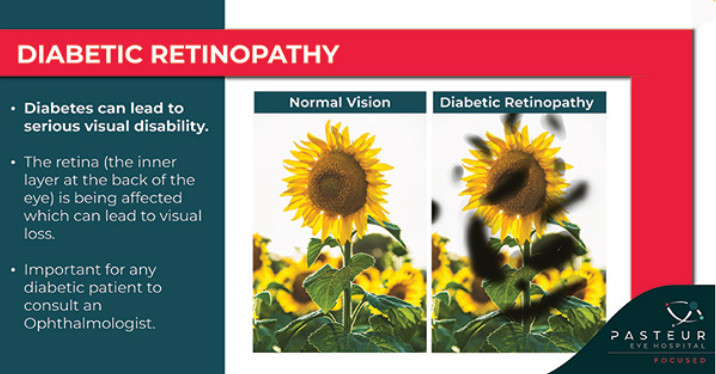Pasteur Eye Hospital
Eye Conditions
Contact Us
Author: Dr Johan Eloff | Date: 14 November 2020

Diabetic Retinopathy (DR) is a complication of diabetes mellitus.
The retina – the inner layer at the back of the eye, is being affected. It can lead to visual loss.
Appropriate management has been shown to decrease the risk of visual loss by 90%.
Over the past three (3) decades the number of people with diabetes mellitus has more than doubled globally.
4.4% of diabetics have advanced Diabetic Retinopathy, causing severe vision loss.

Aggressive glucose control has shown to significantly reduce the rate of development and progression of Diabetic Retinopathy in both type 1 and 2 diabetes mellitus.
Regular eye exams and appropriate management can significantly reduce the loss of vision from diabetes mellitus.
Diabetic Retinopathy can have a profound effect on vision, yet most patients are asymptomatic until the disease progresses to an advanced stage.
The most common cause of visual loss among patients with Diabetic Retinopathy is diabetic macular edema (DME). It causes swelling of the central retina.
Breakdown of the blood – retinal barrier and leakage from retinal capillaries (small vessels) is a hallmark of Diabetic Retinopathy.
Vision loss in Diabetic Retinopathy can also occur secondary to ischemia (non-perfusion,) vitreous haemorrhage, and retinal detachment.
The referral of a diabetic patient to an Ophthalmologist is of the utmost importance. The specialist will perform a thorough eye examination. Special investigations will be done to classify the stage of the Diabetic Retinopathy. The specific classification will then determine further management of the patient. This includes treatment and the recommended follow-up intervals.
Special ancillary tests can include the following:
Colour fundus photography
Optical Coherent Tomography (OCT)
Ultrasonography
Fluorescein angiography
Therapeutic interventions that are used include:
Lazer photocoagulation
Intra vitreal injections (e.g. ANTI-VEGF)
Surgery e.g. pars plana vitrectomy
Diabetic Retinopathy can lead to serious visual disability.
Consultation with an Ophthalmologist is very important in any diabetic patient.
Adequate sugar control in diabetics is essential.
Sources:
Extract from Diabetic Retinopathy Epidemiology diagnosis and management.)
(AAO – American Academy of Ophthalmology – last update 8/11/2019)
Pasteur Eye Hospital
Eye Conditions
Contact Us
© Copyright 2022 Pasteur Eye Hospital. All Rights Reserved.
No article or picture may be reproduced\published without the written consent of Pasteur Eye Hospital.
Managed with ❤️ by Cuberoo